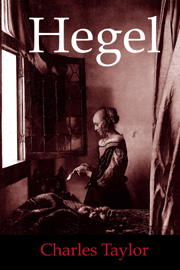Book contents
- Frontmatter
- Contents
- Preface and Acknowledgements
- Abbreviations
- German words used in text
- PART I THE CLAIMS OF SPECULATIVE REASON
- PART II PHENOMENOLOGY
- PART III LOGIC
- IX A Dialectic of Categories
- X Being
- XI Essence
- XII The Concept
- XIII The Idea in Nature
- PART IV HISTORY AND POLITICS
- PART V ABSOLUTE SPIRIT
- PART VI CONCLUSION
- Biographical Note
- Bibliography
- Analytical list of main discussions
- Index
XIII - The Idea in Nature
Published online by Cambridge University Press: 05 June 2012
- Frontmatter
- Contents
- Preface and Acknowledgements
- Abbreviations
- German words used in text
- PART I THE CLAIMS OF SPECULATIVE REASON
- PART II PHENOMENOLOGY
- PART III LOGIC
- IX A Dialectic of Categories
- X Being
- XI Essence
- XII The Concept
- XIII The Idea in Nature
- PART IV HISTORY AND POLITICS
- PART V ABSOLUTE SPIRIT
- PART VI CONCLUSION
- Biographical Note
- Bibliography
- Analytical list of main discussions
- Index
Summary
We have in the logical Idea the pure inner thought of the world. But the truth of this entails that it go over not just in inner necessity but in reality into a world. And hence the Logic ends by deducing the fact of nature. In other words we have just shown that everything emanates from an inner necessity and thus that Being is self-related as a totality, and hence immediate. But this as Hegel says, is no transition, or becoming; it is not like the moving from a less perfect to the more perfect form. These transitions were between levels within the totality. Here we have nothing but the totality itself as we have already shown it to be.
The point is that real self-subsistent necessity has to inhere in an independent reality. It must be a free necessity, that is, must emanate from the reality itself as its own. And this means that there must be a free self-subsisting being which has its own necessity. Hence says Hegel the freedom of the Idea entails that it ‘leaves itself free’ (WL, 11, 505); that it must issue in, be a reality which is not held in the lead strings of the Idea as an external source of control, but which itself has this necessity. But to be is to be determinate. Determinancy implies that things are really external to each other; and this means that they exist in space and time.
- Type
- Chapter
- Information
- Hegel , pp. 350 - 362Publisher: Cambridge University PressPrint publication year: 1975



